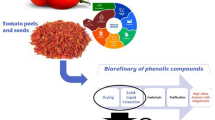Abstract.
The effects of peeling and laboratory- or industrial-scale heating on carotenoid content and radical scavenging activity of tomato and tomato-virgin olive oil mixtures were investigated. A decrease in carotenoid content was detected only after long heating times. Such a decrease was lower for the unpeeled than for the peeled tomatoes. No change, either in lycopene concentration or in the chain-breaking activity of the lipophilic fractions, was observed when both laboratory- and industrial-scale heating treatments were performed on peeled-tomato puree containing 5% virgin olive oil. The aqueous fractions, including high-molecular-weight brown polymers formed as a consequence of heating, were also characterized for color, elementary composition and antioxidant activity.
Similar content being viewed by others
Author information
Authors and Affiliations
Additional information
Electronic Publication
Rights and permissions
About this article
Cite this article
Graziani, G., Pernice, R., Lanzuise, S. et al. Effect of peeling and heating on carotenoid content and antioxidant activity of tomato and tomato-virgin olive oil systems. Eur Food Res Technol 216, 116–121 (2003). https://doi.org/10.1007/s00217-002-0626-7
Received:
Revised:
Issue Date:
DOI: https://doi.org/10.1007/s00217-002-0626-7




